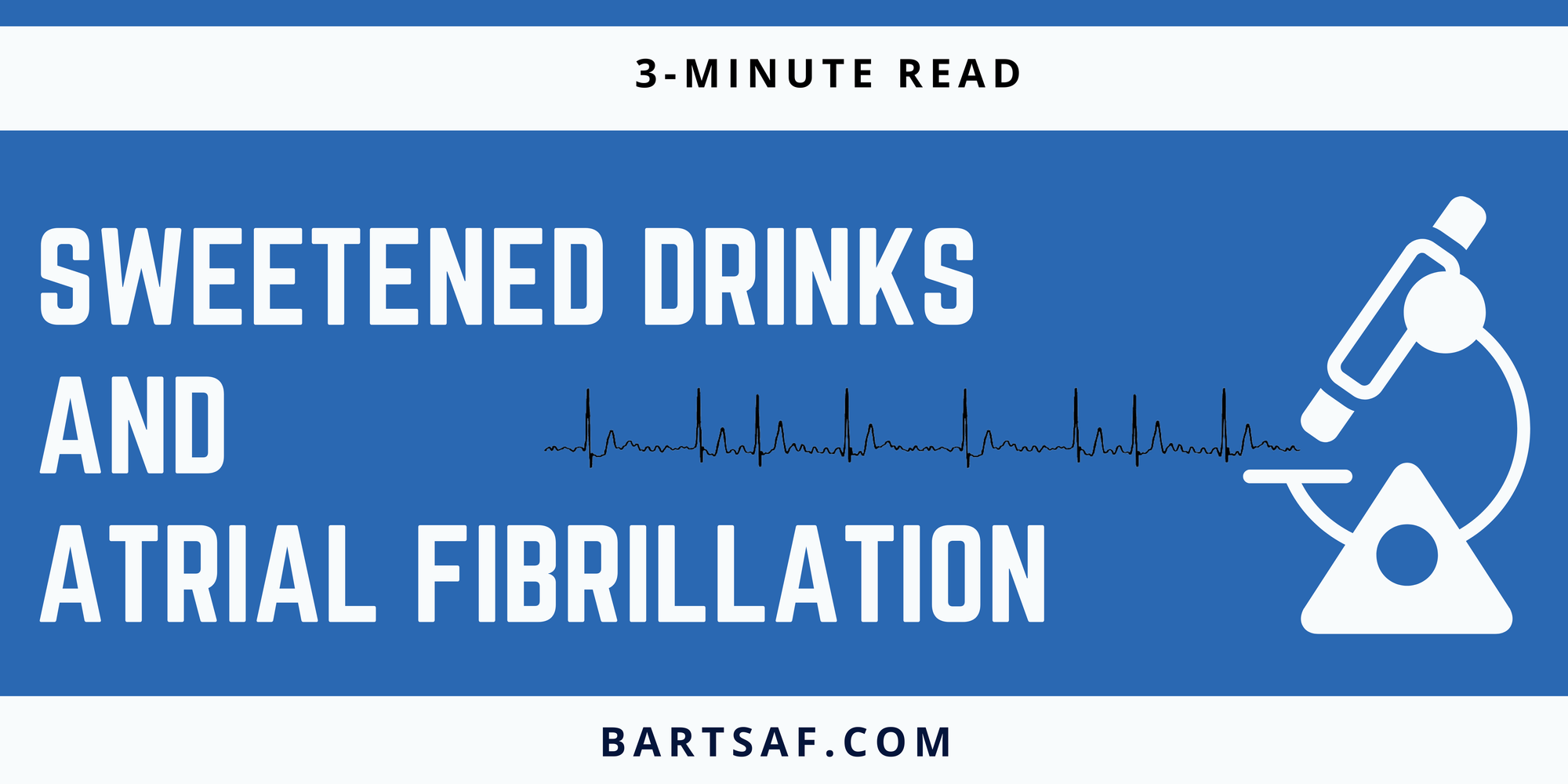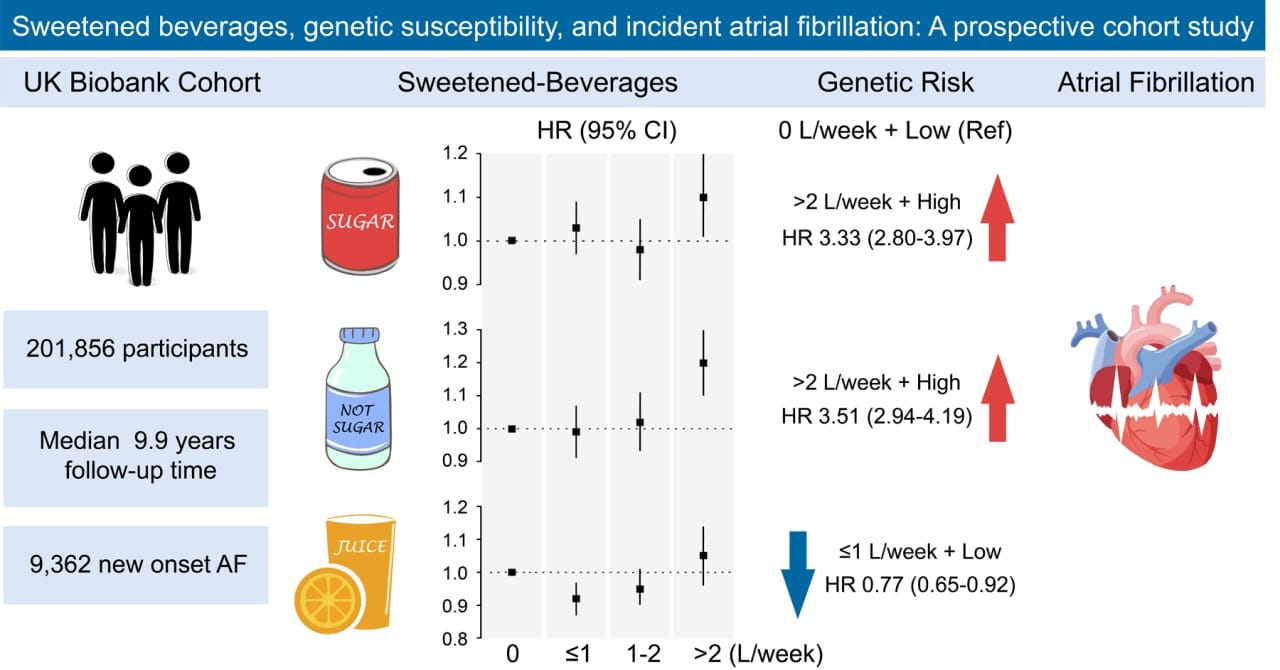Sweetened drinks and Atrial Fibrillation

Studies of the effects of diet on heart disease are challenging to conduct.
Trying to compare health outcomes in vegans versus vegetarians versus meat-eaters is challenging because of all the other associations with these behaviours that you can’t balance. So it isn’t clear if you are measuring the impact of the diet or a different behaviour that may be causing the risk.
Despite these limitations, I want to discuss a recent article that has been published in 'Circulation: Arrhythmia and Electrophysiology'- a respectable journal. Artificially sweetened beverages are a vice that I do partake in and so a study of the impact of these drinks in a cardiac journal piqued my interest. The risk to dental and gum health is something my dentist tells me at each check-up but it is a risk:benefit trade-off I choose to make.
But does the regular consumption of artificially-sweetened drinks (Coke Zero, Diet Coke, Pepsi Max) or sugar-sweetened drinks (Coke, Lucozade) increase your risk of Atrial Fibrillation?
The UK has an incredibly valuable research resource called the UK Biobank. It is a long-term study of 500,000 people in the UK who have patiently gone through frequent surveys, tests and investigations to compile one of the largest detailed registries of people we have in the world.
Sidenote: I interviewed the Principal Investigator and Chief Executive of the UK Biobank, Sr Rory Collins in 2022- he’s one of the most accomplished doctors I’ve had the privilege to speak to, having led the early trials on Heart Attack treatments and Statins. Do take the opportunity to hear his story here: https://youtu.be/qi3e8nM7T64
The Sweetened beverages vs AF study.
The study analysed more than 200,000 participants from the UK Biobank who did not have AF at the start and were followed up for a median of 9.9 years. Over that period individuals who drank more than 2 litres/week of artificially sweetened beverages had a 20% greater likelihood of developing atrial fibrillation compared to participants who did not. The risk of AF was 10% higher in participants who drank sweetened beverages.
However, observational studies are designed to stimulate further research and hypotheses rather than change behaviour on their own. Firstly, the volume of drinks that a participant consumed was derived from self-reported numbers of consumption on a single day and extrapolated out to give the weekly intake. The ‘high consumption’ groups may have also had other risk factors that were not balanced before the comparison- for example, obesity, poor diets, and high blood pressure- and these may drive the increased risk rather than the beverage intake. A secondary finding by the researchers was that participants who drank unsweetened fruit juices had a lower risk of Atrial Fibrillation (but this was only in participants who drank less than one litre per week, it was not seen in participants who drank more than this.
Interestingly, the study does not detail the types of drinks included in each category. Although the risk of AF has not been shown with reasonable amounts of coffee or tea, the relationship with energy drinks is less clear. Therefore the impact of specific types of drinks and associated behaviours (night shift work, high-stress jobs, stimulant use) may also be a factor that was not measured nor controlled for.

I must acknowledge my inherent bias to want artificially sweetened beverages to be without AF risk. And this study does generate an important hypothesis on the basis of the associations shown in this study. Participants who consumed artificially sweetened drinks were at a higher relative risk than participants who drank sugar-sweetened drinks. This goes against the data in their associations with obesity and cardiovascular disease. Therefore, the possibility that artificial sweeteners can cause AF has been raised is something that warrants further study and investigation.
Summary
It is hard to do dietary studies because it is hard to recruit patients willing to cut out (or take) prescribed amounts of food or drinks for prolonged periods. Energy drinks have been shown to temporarily alter the rate of heart conduction and contractions but no clear link with long-term heart outcomes has been shown yet.
Two litres of artificially sweetened drinks is a lot- that is more than six cans of Diet Coke a week. Every week for nine years. The increase in risk was not seen in participants who drank one litre or one-two litre of these drinks. Although this study doesn’t demonstrate that two litres of coke or diet coke per week causes atrial fibrillation- the risk to oral health and of obesity with sugary drinks is clear so drinking to excess should be avoided for these reasons alone.
Reference: Sun Y, Yu B, Yu Y, Wang B, Tan X, Lu Y, Wang Y, Zhang K, Wang N. Sweetened Beverages, Genetic Susceptibility, and Incident Atrial Fibrillation: A Prospective Cohort Study. Circ Arrhythm Electrophysiol. 2024 Mar;17(3):e012145. doi: 10.1161/CIRCEP.123.012145. Epub 2024 Mar 5. PMID: 38440895.
